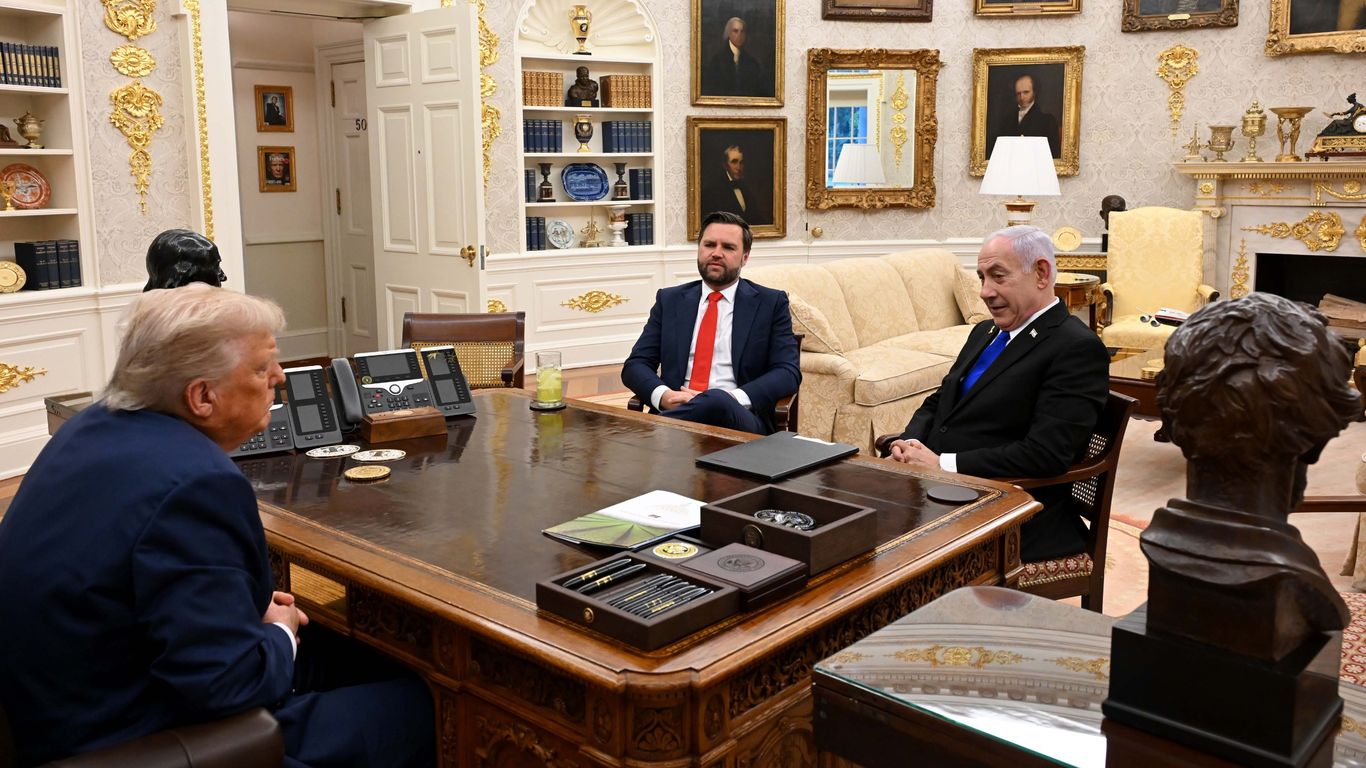US, Israel, and Hamas Fail to Reach Ceasefire Agreement in Gaza

Introduction
The ongoing conflict in Gaza has been a major point of discussion in recent months, with Israel and the US attempting to broker a ceasefire in the region. However, talks in Qatar have hit a roadblock as both sides have failed to reach an agreement. The latest development in the negotiations has seen US special envoy Steve Witkoff accusing Hamas of lacking the desire to reach a truce in Gaza.
Key Details
The talks, which have been ongoing for several weeks, have seen both sides presenting their demands and attempting to find common ground. However, according to Witkoff, Hamas has consistently shown a lack of willingness to reach a ceasefire. This is not the first time that Hamas has been accused of hindering peace talks, as the militant group has previously been known to reject proposals and agreements.
Despite these challenges, the US is determined to continue its efforts in brokering a ceasefire in Gaza. With the situation in Gaza remaining tense, it is crucial for both sides to come to a resolution and end the violence that has affected thousands of civilians.
Impact
The failure of the talks in Qatar has highlighted the ongoing challenges in reaching a lasting peace in Gaza. The US and Israel have both expressed their disappointment in Hamas' lack of cooperation, and it remains to be seen how this will impact future negotiations. The ongoing conflict
About the People Mentioned
Steve Witkoff
Steve Witkoff is an American real estate developer, investor, and attorney, born on March 15, 1957, in the Bronx, New York. He began his career as a real estate lawyer, working for prominent New York firms such as Dreyer & Traub and Rosenman & Colin, where he represented major developers and investors. In 1985, Witkoff co-founded Stellar Management with Laurence Gluck, acquiring and managing residential properties in New York City, particularly in Harlem, Washington Heights, and the Bronx. The firm later expanded into Manhattan office buildings, including the notable 33 Maiden Lane, which was leased to the Federal Reserve Bank of New York. In 1997, Witkoff founded the Witkoff Group, a privately held real estate company headquartered in New York City. Under his leadership, the Witkoff Group has financed, repositioned, and constructed more than 70 properties across major U.S. cities and internationally, with offices in New York, Los Angeles, and Miami. The company has been involved in high-profile acquisitions such as the Daily News Building, the Woolworth Building, and the Park Lane Hotel in Manhattan. Witkoff has also led major redevelopment projects, including the revitalization of the Shore Club in Miami Beach and the One High Line condominium in Manhattan. Witkoff is recognized for his expertise in real estate finance and development, and his company has partnered with international investors and sovereign wealth funds. In 2024, following the U.S. presidential election, Witkoff was named co-chair of President-elect Donald Trump’s inaugural committee and appointed as U.S. Special Envoy to the Middle East, focusing on diplomatic efforts related to the Israel-Hamas conflict and broader regional negotiations. Witkoff’s recent activities include high-value property transactions in Miami Beach and continued involvement in major real estate developments across the United States.
About the Organizations Mentioned
Hamas
**Hamas** is a Sunni Islamist Palestinian nationalist organization that functions both as a political party and a militant group, primarily operating in the Gaza Strip, which it has governed since 2007. Founded in 1987 by Ahmed Yassin amid the First Intifada, Hamas emerged from the Muslim Brotherhood and initially had covert Israeli support as a counterweight to the secular Palestinian Liberation Organization (PLO)[3][1]. It combines political governance with an armed wing, the al-Qassam Brigades, committed to armed resistance against Israel, which it refuses to recognize as a legitimate state[1][3]. Hamas’s political rise culminated in a 2006 electoral victory in the Palestinian Legislative Council, campaigning on anti-corruption and resistance platforms. After violently seizing Gaza from the rival Fatah faction in 2007, Hamas has maintained de facto control there despite international isolation and blockades imposed by Israel and Egypt[3]. Its governance has been marked by repeated conflicts with Israel, including major wars in 2008–09, 2012, 2014, 2021, and the ongoing intense conflict triggered by Hamas’s surprise October 2023 attack killing nearly 1,200 Israelis and taking hostages[1][2][3]. Hamas benefits from regional support, especially from Iran, which supplies funding and weapons, as well as financial and political backing from Turkey and Qatar. These alliances form part of a broader "axis of resistance" against Israel, which includes groups like Hezbollah and Palestinian Islamic Jihad[2]. Hamas also operates fundraising networks globally, sometimes using charities as fronts to support its military activities[4]. The group is designated a terrorist organization by many countries, including the United States, which has increased military aid to Israel following recent escalations[2][6]. Despite modifying its 1988 charter in 2017 to soften some language, Hamas continues to reject Israel’s legitimacy and pursues all forms of resistance[1]. Its enduring political
US
The query seems to be about providing a summary of the organization "US," which could be interpreted as the United States government or a specific entity within it. However, without a clear reference to an "organization" named "US," I will provide a comprehensive overview of the United States government, focusing on its structure, history, achievements, current status, and notable aspects relevant to business and technology. ## Overview of the United States Government The United States government is a federal republic with a system divided into three branches: the legislative, executive, and judicial. This structure is designed to provide checks and balances on each branch. ## History The U.S. government was established in 1789 under the Constitution, which outlines the framework of the federal system. Over time, the government has evolved through numerous amendments and reforms, shaping policies and laws that impact various sectors, including business and technology. ## Key Achievements - **Economic Growth**: The U.S. has been a global leader in economic growth, innovation, and technological advancements, fostering a strong business environment. - **Technological Advancements**: The government has supported significant technological developments, such as the internet and space exploration, through funding and regulatory frameworks. - **Regulatory Frameworks**: Agencies like the Federal Trade Commission (FTC) and the Federal Communications Commission (FCC) play crucial roles in regulating industries and ensuring consumer protection. ## Current Status Currently, the U.S. government is engaged in various initiatives to address contemporary challenges such as climate change, cybersecurity, and healthcare reform. The government also continues to evolve its organizational structure, with ongoing discussions about the role of the executive branch, as seen in initiatives like Project 2025. ## Notable Aspects - **Project 2025**: This initiative, backed by the Heritage Foundation, aims to restructure the federal government to align with conservative ideals, potentially impacting civil rights and executive branch powers. - **Standards and Regulations**: The U.S. Standards Strategy,
Israel
Israel is a highly developed democratic country in West Asia, known for its advanced free-market economy and significant contributions to global business and technology sectors. Established in 1948, Israel has grown into a regional powerhouse with a population of approximately 9.5 million as of 2025. It is the only country with a Jewish majority population and operates under a parliamentary democracy with strong political rights and civil liberties[2][5]. Israel's economy is among the most sophisticated in the Middle East, ranked 25th globally by nominal GDP according to the IMF in 2025. It boasts the second-largest number of startups worldwide, only behind the United States, and the third-largest number of companies listed on NASDAQ after the U.S. and China. This vibrant tech ecosystem attracts major multinational corporations such as Intel, Microsoft, Apple, IBM, Google, and Facebook, all of which have established research and development centers in Israel, often marking their first overseas R&D presence there[1]. The country’s main economic drivers include high-tech industries, industrial manufacturing, and diamond cutting and polishing, with the diamond sector accounting for 21% of exports in 2017[1]. Israel’s technological innovation extends to energy, with recent discoveries of natural gas reserves and a growing solar energy industry aiming to reduce dependency on imports[1]. Despite its small size, Israel's infrastructure rivals developed nations, supported by a sophisticated welfare state and a powerful military known for advanced capabilities, including nuclear weapons[1]. Regionally, Israel faces ongoing geopolitical instability and conflict, which influence its security policies and international relations. Internal and external tensions persist, particularly regarding the Palestinian territories, impacting both domestic and foreign policy dynamics[3][4]. Public opinion within Israel reflects concerns about international respect and peace prospects[6]. Overall, Israel stands out as a dynamic hub of innovation, economic resilience, and geopolitical significance, making it a critical player in global business and technology news.


















